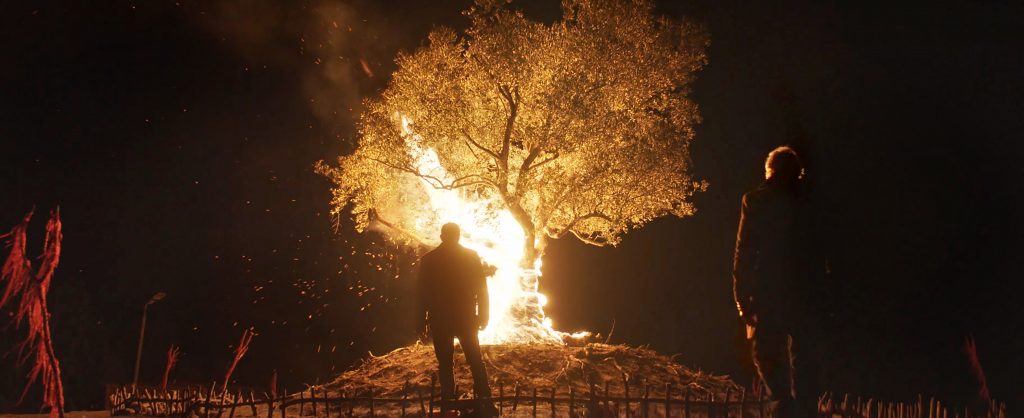Ali Atay, Cenk Erturk, drama, film festivals, Haluk Bilginer, movies, New York City, Noah Land, Nuh Tepesi, reviews, Tribeca Film Festival, Turkey
April 25, 2019
by Carla Hay

“Noah Land” (“Nuh Tepesi”)
Directed by Cenk Erturk
Turkish with subtitles
World premiere at the Tribeca Film Festival in New York City on April 25, 2019.
There’s a whole lot of daddy issues going on in “Noah Land,” a Turkish movie about family, death and religious conflict. The movie centers on Ibrahim (played by Haluk Bilginer), a senior citizen with a terminal illness, and Ömer (played by Ali Atay), who is Ibrahim’s son. Ibrahim’s dying wish is to be buried underneath a tree that he says he planted as a boy. The problem is that land where the tree was planted has become a holy site called the “Noah Tree.” The locals in the community don’t believe Ibrahim’s claim that he planted the tree. The villagers think the tree was planted by the biblical figure Noah after the Great Flood, so it would be sacrilegious to dig up the area surrounding the tree.
Regardless of who planted the tree, Ibrahim claims that his family still owns the land, so he has a right to be buried there. But the family had moved away more than 45 years ago, and there are no records to prove that the family legally owns the land. Ibrahim enlists Ömer to help him in his fight to be buried under the tree, and Ömer finds himself in heated conflicts with people who might go to extremes to protect the land.
Ömer is fraught with other emotional conflicts, because Ömer is still seething with resentment over his love/hate relationship with Ibrahim. The way Ömer remembers it, Ibrahim was often an absentee father when Ömer was growing up, and when Ibrahim was around to raise Ömer, he was overly critical of his son. Now that Ibrahim is asking for Ömer’s help in his last days before he dies, Ömer wants to be a good son, but he can’t help but feel that he’s being used by his father for selfish reasons.
And there are other daddy issues, because Ömer’s estranged wife (played by Hande Doğandemir) is pregnant, and he’s feeling anxiety about how he will be involved in his child’s life. Ömer fears that he might turn into an absentee father himself, so he makes an attempt to get back together with his wife, but she refuses, and says she wants to go through with their divorce. Ömer’s failed marriage and impending fatherhood have forced to him look at himself and his shortcomings—and he doesn’t like what he sees because he might be more like his father than he cares to admit. And he must ask himself, “Who is the real enemy?” Is it the community, his father, or is it himself?
Essentially, Ömer has to decide how far he’s willing to go to help his father, and how much he’s willing to forgive him for any real wrongdoings. Father and son spend quite a few scenes bickering back and forth, and they confront some of the issues from their past. “Noah Land” director Cenk Erturk, who also wrote the film’s screenplay, does an admirable job of portraying the messiness of complicated family issues.
Ömer is also realistically written as a flawed human being who’s having a hard time coping with what’s going on in his life—he’s often ill-tempered, petty, and understandably stressed out because he’s lost his wife and is about to lose his father. But all the arguing in the movie becomes a tad repetitive, and it’s dragged out for too long. “Noah Land” could have used some more editing to weed out some scenes that serve a redundant purpose and to tighten the suspense. The cast members, especially Atay, do a fine job in their roles. Some viewers might have a problem with the movie’s ending, but the actions taken at the conclusion of the film are authentic to the characters involved.
